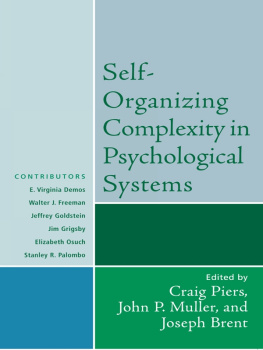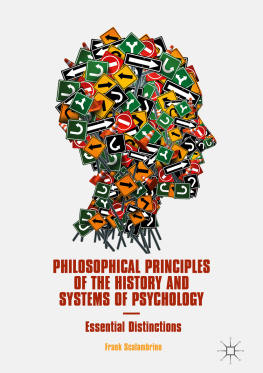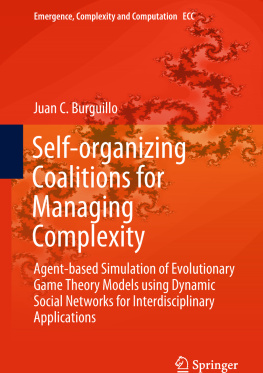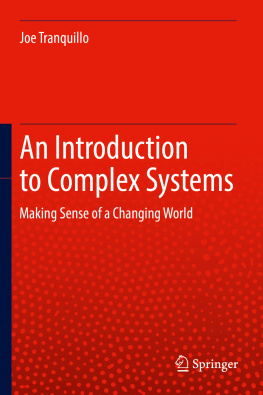Brent Joseph - Self-organizing complexity in psychological systems
Here you can read online Brent Joseph - Self-organizing complexity in psychological systems full text of the book (entire story) in english for free. Download pdf and epub, get meaning, cover and reviews about this ebook. City: Lanham, year: 2007, publisher: Jason Aronson, genre: Romance novel. Description of the work, (preface) as well as reviews are available. Best literature library LitArk.com created for fans of good reading and offers a wide selection of genres:
Romance novel
Science fiction
Adventure
Detective
Science
History
Home and family
Prose
Art
Politics
Computer
Non-fiction
Religion
Business
Children
Humor
Choose a favorite category and find really read worthwhile books. Enjoy immersion in the world of imagination, feel the emotions of the characters or learn something new for yourself, make an fascinating discovery.
- Book:Self-organizing complexity in psychological systems
- Author:
- Publisher:Jason Aronson
- Genre:
- Year:2007
- City:Lanham
- Rating:4 / 5
- Favourites:Add to favourites
- Your mark:
- 80
- 1
- 2
- 3
- 4
- 5
Self-organizing complexity in psychological systems: summary, description and annotation
We offer to read an annotation, description, summary or preface (depends on what the author of the book "Self-organizing complexity in psychological systems" wrote himself). If you haven't found the necessary information about the book — write in the comments, we will try to find it.
Self-organizing complexity in psychological systems — read online for free the complete book (whole text) full work
Below is the text of the book, divided by pages. System saving the place of the last page read, allows you to conveniently read the book "Self-organizing complexity in psychological systems" online for free, without having to search again every time where you left off. Put a bookmark, and you can go to the page where you finished reading at any time.
Font size:
Interval:
Bookmark:
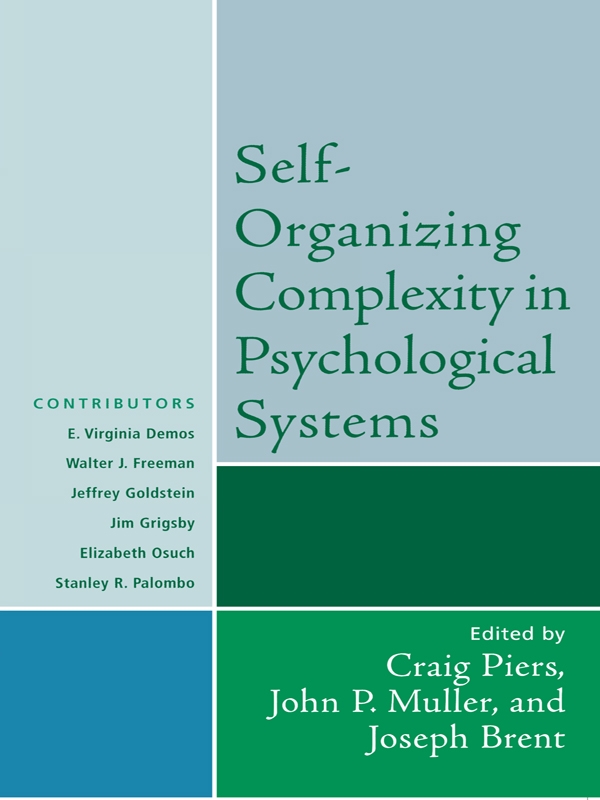
Series Editor: Morris N. Eagle
Psychological Issues is a monograph series that was begun by G. S. Klein in the 1950s. The first manuscript was published in 1959. The editors since Kleins death have been Herbert Schlesinger, Stuart Hauser, and currently, Morris Eagle.
The mission of Psychological Issues is to publish intellectually challenging and significant manuscripts that are of interest to the psychoanalytic community as well as psychologists, psychiatrists, social workers, students, and interested lay people. Since its inception, a large number of distinguished authors have published their work under the imprimatur of Psychological Issues. These authors include, among many others, Erik Erikson, Merton Gill, Robert Holt, Phillip Holzman, David Rapaport, and Benjamin Rubinstein. Psychological Issues is fortunate in having an equally distinguished Editorial Board consisting of leaders in their field.
Members of the Board
Sidney Blatt, Yale University School of Medicine
Margaret Brenman-Gibson (deceased)
Wilma Bucci, Adelphi University, Derner Institute
Morris Eagle, Adelphi University, Derner Institute
Robert Emde, University of Colorado Health Center
Peter Fonagy, University College London, Psychoanalysis Unit
Leo Goldberger, New York University
Stuart Hauser, Judge Baker Childrens Center
Robert Holt
Philip S. Holzman (deceased)
Anton Kris, Beth Israel Hospital
Lester Luborsky, University of Pennsylvania
Mary Main, University of California at Berkeley
Humphrey Morris, Harvard Medical School
Herbert Schlesinger, New School for Social Research
Robert Wallerstein
Other Books in the Series
Erik Erikson and the American Psyche: Ego, Ethics, and Evolution
Daniel Burston
Help Him Make You Smile: The Development of Intersubjectivity in the Atypical Child
Rita S. Eagle
The Embodied Subject: Minding the Body in Psychoanalysis
edited by John P. Muller and Jane G. Tillman
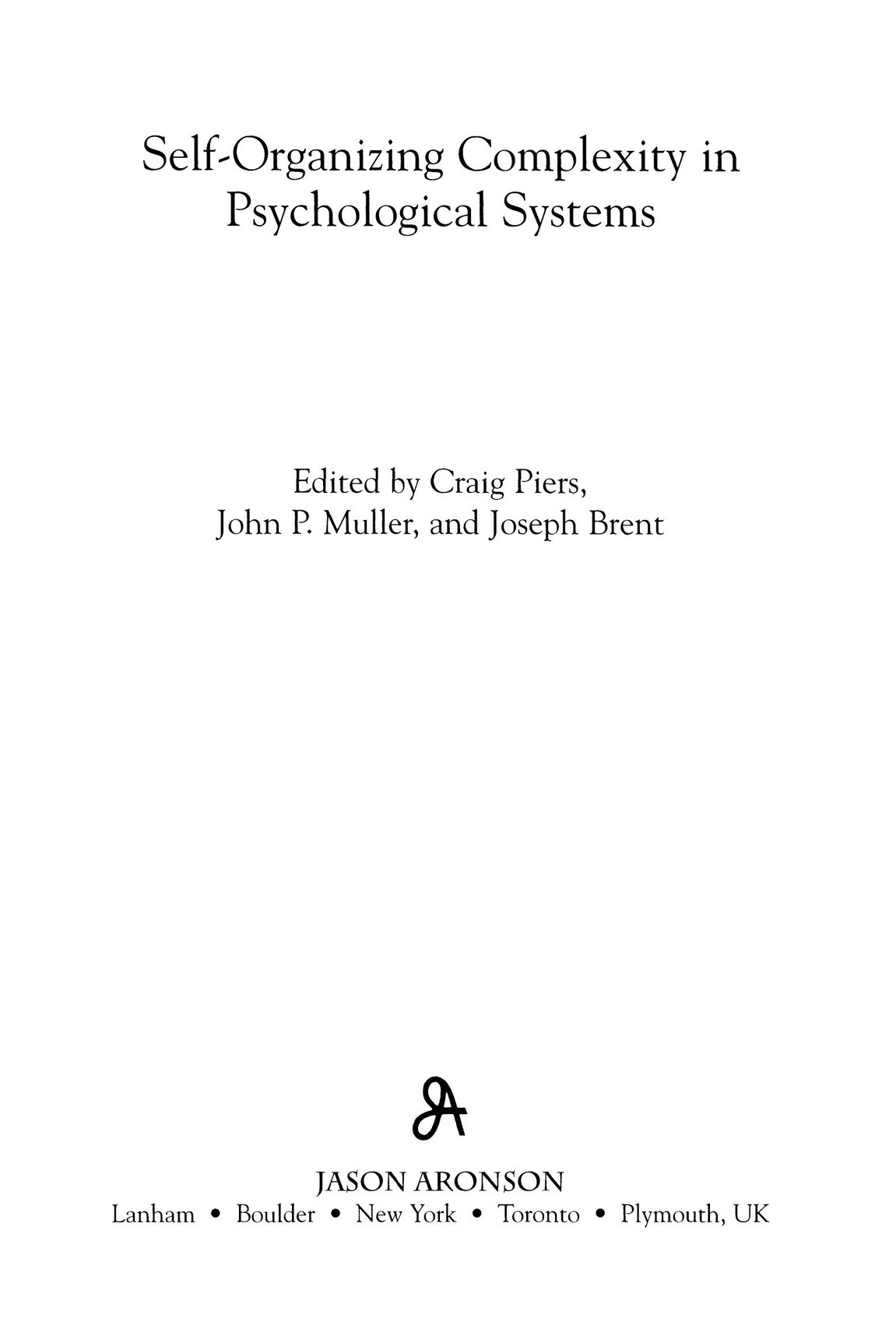
Published in the United States of America
by Jason Aronson
An imprint of Rowman & Littlefield Publishers, Inc.
A wholly owned subsidiary of
The Rowman & Littlefield Publishing Group, Inc.
4501 Forbes Boulevard, Suite 200, Lanham, Maryland 20706
www.rowmanlittlefield.com
Estover Road
Plymouth PL6 7PY
United Kingdom
Copyright 2007 by Jason Aronson
All rights reserved. No part of this publication may be reproduced, stored in a retrieval system, or transmitted in any form or by any means, electronic, mechanical, photocopying, recording, or otherwise, without the prior permission of the publisher.
British Library Cataloguing in Publication Information Available
Library of Congress Cataloging-in-Publication Data
Self-organizing complexity in psychological systems / edited by Craig Piers, John P.
Muller, and Joseph Brent.
p. cm.(Psychological issues)
9781461630654
1. PsychologyPhilosophy. 2. Complexity (Philosophy) I. Piers, Craig, 1964-II. Muller, John P., 1940- III. Brent, Joseph.
BF38.S45 2007
150.1dc22
2006102101
Printed in the United States of America
 The paper used in this publication meets the minimum requirements of American National Standard for Information SciencesPermanence of Paper for Printed Library Materials, ANSI/NISO Z39.48-1992.
The paper used in this publication meets the minimum requirements of American National Standard for Information SciencesPermanence of Paper for Printed Library Materials, ANSI/NISO Z39.48-1992.
John P. Muller, Ph.D.
Some of us represented in this monograph met in seminars on complexity theory organized by the Forum on Psychiatry and the Humanities at the Washington School of Psychiatry. The forum provided an opportunity to examine a wide range of developments in a new paradigm of inquiry: chaos and catastrophe theory, self-organizing complexity, closure, and emergenceall examples of the broad discipline dealing with nonlinear dynamic systems. This emerging discipline shows many points of convergence with psychological theory and practice, emphasizing that history is irreversible and discontinuous, that small early interventions can have large and unexpected later effects, that each life trajectory is unique yet patterned, that measurement error is not random and cannot be justifiably distributed equally across experimental conditions, and that change is more likely to emerge under conditions of optimal turbulence. For these and other reasons, this volume will, we hope, be of interest to those looking for a contemporary perspective on the mind and the making of meaning.
Making meaningful links in experience is crucial to the development of closure, that process whereby a living organism as a center of movement achieves self-maintenance through recursive self-referential acts. Closure does not mean closing a system, but rather establishing a reliably variable internal context from which ones environment can be interpreted. Such interpretive activity is based on the development of syntactic autonomy, the ability to sustain an internal vehicle for classification of environmental conditions grounded in feedback from actions based on the classification (Rocha 2000, 210). In this way, a distinction between within and without and a boundary between self and other can be maintained.
In his overview of pertinent studies, Guastello (2001) provides a useful surveyof how nonlinear mical systems theory has impacted psychology in three broad areas: cognitive science, social organization, and clinical studies. He calls attention to the work of Hardy (1998) on semantic networks as promising, for their continual elaboration may be the most pervasive dimension of self-organizing complexity. I find the work of Charles Sanders Peirce (1992) especially relevant here. By proposing a triadic model for the generation of signs and meaning, Peirce establishes a cogent foundation for the spontaneous, unpredictable, and self-organizing aspects of interpretive action. Signs not only stand for their objects in some respect, but they also generate their meanings, which Peirce called their interpretants. Such interpretants are the effects produced by the sign on the receivers feelings, actions, and ideas. These effects, largely unconscious, become new signs, in turn producing their effects on both oneself and others. In this way, Peirce provides a useful and perhaps even testable model for the unconscious clustering of associations as well as for the emergent properties of therapeutic speech.
At the end of this monograph, readers will find a useful glossary of terms that bridges distinctions drawn by this evolving perspective and joins them to some terms we now take for granted as part of an evolutionary framework. This framework properly emphasizes that nothing evolves in isolation but rather in coevolution with the complexifying entities and their energy fields that constitute the nested systems of the universe. In this coevolutionary landscape, we can say, joining Julian Huxley, that in us evolution was at last becoming conscious of itself (1959, 20). This mutation is primarily an effect of language, for language has altered the development of the human brain (Deacon, 1997) and thereby the landscape of the Earth itself. Language has become the dominant systematizing force on our planet, and perhaps eventually in our solar system, and maybe beyond. The web of human culture not only differentiates and consolidates us but it also extends our sphere of influence. The Internet, exemplifying a self-organizing, complexifying system, signals the emergence of what Teilhard de Chardin (1955) called the noosphere, with its worldwide webbing and hyperpersonal organization. This is to say that many of the ideas favored by nonlinear dynamical systems theorists have their own history of emergence. For example, Julian Huxley writes of Teilhard de Chardins work as follows:
Font size:
Interval:
Bookmark:
Similar books «Self-organizing complexity in psychological systems»
Look at similar books to Self-organizing complexity in psychological systems. We have selected literature similar in name and meaning in the hope of providing readers with more options to find new, interesting, not yet read works.
Discussion, reviews of the book Self-organizing complexity in psychological systems and just readers' own opinions. Leave your comments, write what you think about the work, its meaning or the main characters. Specify what exactly you liked and what you didn't like, and why you think so.

